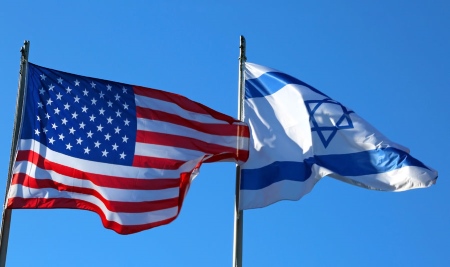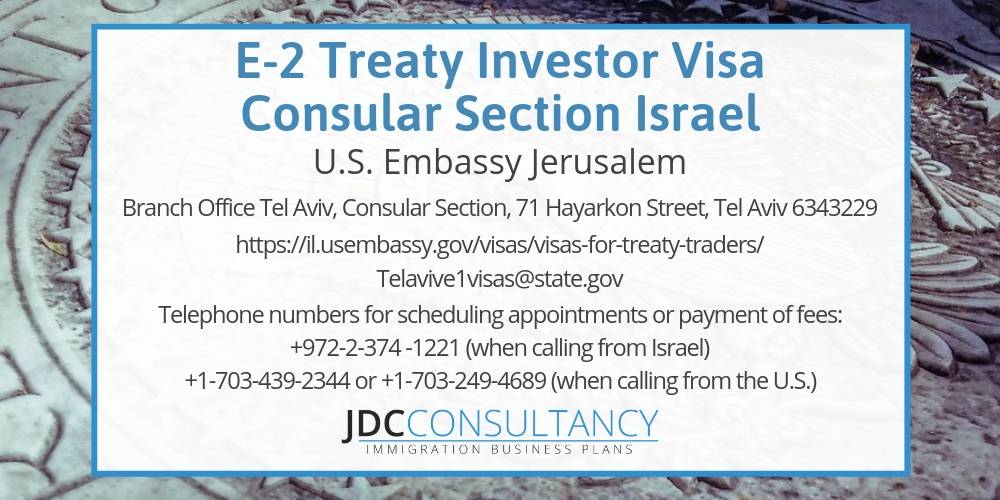Close allies with the United States tend to enjoy special privileges where visas are concerned. This holds true for business visas, like the E2 treaty investor visa, which makes it surprising that, despite numerous efforts by both the United States and Israeli governments over the years, Israeli entrepreneurs have only recently been able to apply for E-2 visas. This has all changed, as the Israeli government has finally created a satisfactory equivalent program for American entrepreneurs seeking to do business in Israel which, in turn, allows Israeli entrepreneurs the opportunity to obtain their E-2 visas now.
As of May 1st, 2019 the E2 Treaty Investor Visa is available to Israeli citizens wishing to make a substantial investment in a new start-up business or franchise, or by purchasing an existing business or franchise in the U.S. A qualifying E-2 investment must also be at-risk and in a real, operating commercial enterprise.
Israel: A Global Innovation Hub
 This is an exciting time for both Israel and the United States. Both nations thrive on innovation, and Israel’s tech-startup sector is booming. According to the World Economic Forum, Israel creates over 1,000 startups annually and is second in the world for innovation. As of August 2017, there were between 4,300 and 6,000 startup companies active in the country. In terms of startups per capita, no other nation on earth matches Israel.
This is an exciting time for both Israel and the United States. Both nations thrive on innovation, and Israel’s tech-startup sector is booming. According to the World Economic Forum, Israel creates over 1,000 startups annually and is second in the world for innovation. As of August 2017, there were between 4,300 and 6,000 startup companies active in the country. In terms of startups per capita, no other nation on earth matches Israel.
Israel E2
Israeli entrepreneurs are entering the market at all experience levels, from idealistic young creatives to seasoned serial-entrepreneurs in their 50’s and up. What most of them have in common is the desire to bring their innovations to the U.S. market. Access to the E-2 visa program gives them unprecedented opportunities to share their technological breakthroughs with American firms and to create the “next big thing” in fields like cybersecurity and mobile applications. Israeli entrepreneurs are responsible for the creation of apps used by millions of people to enhance their daily lives, including Viber Messenger, which has over 500 million downloads.
Israeli innovations are saving lives and connecting people with their roots via tech like Zebra, which identifies early signs of breast cancer via an algorithm, and MyHeritage, which helps users trace their heritage and ancestry. Whatever their field, Israeli entrepreneurs, especially in the tech sector, are likely to find a market within the U.S., and the U.S. market is hungry for fresh ideas to improve and simplify daily life.
What is an E2 Visa and Who is it for?
The E2 visa varies from the E1 visa, which is already available for Israeli nationals, in several key aspects. The E-1 Treaty Trader visa is a nonimmigrant visa intended for companies that perform substantial trade (of goods or services) with the United States, and visas are typically granted based on the volume of trade. The E-2 Treaty Investor visa, however, is based on applicants investing substantial “at-risk funds” to support the operation and growth of a business in the United States. Because this number varies based on the type of business an applicant wishes to operate, the E-2 is much better suited to small businesses and startups like those popular with Israeli entrepreneurs. The E2 Investor Visa Minimum Investment Amount depends on the type of business or franchise you invest in and even though it must be a substantial investment, the investment can be lower in some cases. Applicants must be able to prove their investment funds were acquired legally and must be willing to reapply for their visa every two to five years to remain in the United States. They must plan to reside in the U.S. solely for the purpose of operating the business (E-2 Enterprise) and must be prepared to return to their home country if they choose not to renew their visa, or no longer qualify to renew it. All E2 visa applications must be submitted with a comprehensive 5-Year E2 Visa Business Plan.
For many would-be investors, the E-2 visa is more appealing than other visa options because it allows a certain level of flexibility. Travel outside the United States is allowed for E-2 visa holders, and investors maintain control of their funds by operating their own business. For investors seeking to take over an existing business or franchise, the process can often be even simpler, as the business has already proven itself viable. In the eyes of the U.S. government, there is no question of a franchise brand’s legitimacy, which removes the burden of proving intentions from investors. For E-2 visa holders, living and working in the United States with their families is easier than with other visas. Spouses of visa holders can apply for work authorization which, if approved, enables them to work for any employer in the U.S. Dependent children of an E-2 visa holder are permitted to attend U.S. schools until they turn 21. If an E-2 visa holder’s business remains viable and they continue to fulfill all visa requirements, they can remain in the United States as non-immigrants indefinitely. For Israeli entrepreneurs concerned with what will happen to their families if they start businesses in the U.S., the E-2 visa gives enough security to allow them to invest with confidence and continue growing their E-2 enterprise in the U.S.
A Valuable Opportunity for Israeli Entrepreneurs
 In recent years, the addition of new countries whose nationals can apply for an E-2 visa has become increasingly rare. The most recent country to be added to the E2 Visa Countries list was New Zealand on August 1, 2018, but prior to this, the last country was Denmark, on December 10, 2008. Before Denmark, Chile and Singapore were added in 2004. Despite this, approval rates for applicants from treaty countries remain high. 92% of applicants who fit the visa criteria can expect to have their E-2 visa approved; a rate much higher than for other visas, like the H1-B, L-1, and EB-5. In 2017, the United States issued over 43,000 E-2 visas to treaty country nationals, and now Israeli applicants enjoy similar odds of approval for their businesses. For Israeli nationals with tech companies, which often start with only a few highly – skilled employees, the E-2 is a fantastic choice because, although their companies will be required to hire American workers, there is no minimum number of employees, allowing for flexibility during the startup process.
In recent years, the addition of new countries whose nationals can apply for an E-2 visa has become increasingly rare. The most recent country to be added to the E2 Visa Countries list was New Zealand on August 1, 2018, but prior to this, the last country was Denmark, on December 10, 2008. Before Denmark, Chile and Singapore were added in 2004. Despite this, approval rates for applicants from treaty countries remain high. 92% of applicants who fit the visa criteria can expect to have their E-2 visa approved; a rate much higher than for other visas, like the H1-B, L-1, and EB-5. In 2017, the United States issued over 43,000 E-2 visas to treaty country nationals, and now Israeli applicants enjoy similar odds of approval for their businesses. For Israeli nationals with tech companies, which often start with only a few highly – skilled employees, the E-2 is a fantastic choice because, although their companies will be required to hire American workers, there is no minimum number of employees, allowing for flexibility during the startup process.
Several Middle Eastern countries already enjoy the benefits of an investor treaty with the U.S., and 2017 saw substantially more E-2 visas issued to Middle Eastern nationals than during the several previous years. Jordan saw a 117% increase in visa issuances during the five years between 2015 and 2017, Algeria saw a 100% increase, and Lebanon saw an astonishing 200% increase. Some Israeli nationals who hold dual citizenship in countries that already have a treaty agreement have managed to obtain E-2 visas already. Issuances of these visas have risen by 113% from 2015 to 2017. Israelis already see the appeal of the E-2 visa and are using all the resources available to them to apply.
Why Wasn’t the E2 Visa Available to Israelis Before?
Despite the many obvious benefits of allowing Israeli entrepreneurs to access the E2 visa program, the creation of a treaty between the U.S. and Israel has been halted many times since President Obama signed the necessary legislation in 2012 by Israel’s lack of reciprocal investor visa program for U.S. entrepreneurs. After years of tweaking its program to suit USCIS requirements, the nation has created its own equivalent of the E-2 visa; the B-5 visa. Since 2014, Israel has been working to create a truly reciprocal visa, and the B-5 is the first Israeli visa that can be granted based on investment from a U.S. citizen. On June 21, 2018, the necessary regulations were enacted by the Interior Committee of the Knesset, and the U.S. Department of State has decided that the B-5 visa fits its criteria for reciprocity. As of May 1st, 2019 the E2 Treaty Investor Visa is available to Israeli citizens wishing to make a substantial investment in a new start-up business or franchise, or by purchasing an existing business or franchise in the U.S.
How JDC Consultancy Can Help
 Navigating the visa application process can be challenging, and for Israeli E-2 visa applicants, enlisting expert help will streamline the process. One of the key elements of an E-2 investor visa application is a thorough, comprehensive 5-year immigration business plan that demonstrates the investor’s ability to operate a business successfully in the United States for at least the next five years. An E2 business plan is a complex document, requiring in-depth knowledge about what the USCIS is looking for in a company and its investment before it grants a visa. Seeking the services of an experienced immigration lawyer in conjunction with using JDC Consultancy is highly recommended.
Navigating the visa application process can be challenging, and for Israeli E-2 visa applicants, enlisting expert help will streamline the process. One of the key elements of an E-2 investor visa application is a thorough, comprehensive 5-year immigration business plan that demonstrates the investor’s ability to operate a business successfully in the United States for at least the next five years. An E2 business plan is a complex document, requiring in-depth knowledge about what the USCIS is looking for in a company and its investment before it grants a visa. Seeking the services of an experienced immigration lawyer in conjunction with using JDC Consultancy is highly recommended.
JDC Consultancy is here to help ensure E-2 visa applicants can present their business in the best possible light and to increase the likelihood of a successful application. Since 2006, our sole aim has been to help hundreds of entrepreneurs from around the globe realize their dreams of living and working in the United States. We are thrilled to have the opportunity to help Israeli entrepreneurs showcase their businesses and obtain their E-2 visas in the coming years.
Contact Details for the US Embassy in Israel
U.S. Embassy Jerusalem, Consular Section14 David Flusser
Jerusalem 9378322
Website
Email: jerusalemniv@state.gov
Telephone for scheduling or payment of fees: 972-2-374-1221.
If calling from the U.S. +1-703-439-2344 or +1-703-249-4689.
Note: For those applying for the E2 Visa in Israel, you must apply at the Branch Office in Tel Aviv. You must submit your supporting documents including all forms via mail to the address included in the graphic below, also included in the graphic is the US Embassy Jerusalem’s specific email address for EVisa application inquiries, which is also here: Telavive1visas@state.gov


